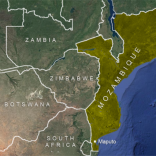Mozambique: Matola hosts civil society march against femicide this Saturday
Mozambique: INAE removes from shelves 19,000 tins of pilchards – Watch

There is a lot of this product on the informal market, but instead of collecting the tins and informing INAE, they are hiding them,” said Rita Freitas. [Photo: TVM]
Mozambique’s National Inspectorate of Economic Activities (INAE) has removed from the market almost 19,000 South African tins of pilchards, following warnings from the South African authorities that the tins had been badly sealed.
Since the tins were no longer airtight, oxidation could set in, and the sardines could be contaminated with rust and bacteria.
The pilchards were tinned by the company West Point Processors, and 12 brands were affected by the problem. Large quantities were exported to other southern African countries, including Mozambique, before the alarm was sounded.
The potentially dangerous tins are in two batches, with the reference numbers ZST 29 and ZSC 29, which makes it fairly easy to identify them and remove them from the shelves. Responsible supermarkets and shopkeepers have cooperated with INAE and willingly removed the pilchards.
The same cannot be said for vendors in the country’s sprawling informal markets. The INAE General Inspector, Rita Freitas, cited by the independent television station STV, said “there is a lot of this product on the informal market, but instead of collecting the tins and informing INAE, they are hiding them”.
Consumers, she urged, should protect themselves and refuse to consume tinned pilchards purchased on the informal market.
The public health directorate in the Ministry of Health has warned “this product can cause cancer”.

As a precautionary measure, the Zambezia provincial delegation of the Mozambican relief agency, the National Disaster Management Institute (INGC), withdrew from distribution 45,000 tins of pilchards. However, INAE has now declared them as fit for consumption since they do not come from the problematic batches that were not sealed properly
They will now be distributed to households affected by storms and flooding in Mocuba, Namacurra and Maganja da Costa districts.












Leave a Reply
Be the First to Comment!
You must be logged in to post a comment.
You must be logged in to post a comment.